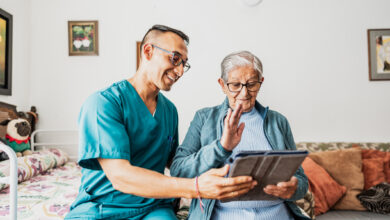Telephones don’t define telenursing

The controversy over this long-standing practice comes from mistaking the tools for the context.
Ever since the telephone connected rural hospitals with the community, rural people have been calling their local nurses seeking care – and the nurses have been providing it.
There is a long history of rural nurses using the telephone to traverse geographic and socioeconomic disparity. It is one of the earliest forms of e-health in rural Australia. As such, one would expect a depth of knowledge and experience from which to draw valuable and positive lessons that could shape the use of technologies.
However, it is the silence surrounding the telephone that has created a void between practice and policy. In this void lies an important lesson for e-health in nursing.
Far from a proud history, providing care via the telephone has been a highly controversial practice, one that rural nurses, health administrators and professional nursing bodies have been denying for years. Prior to the advent of telephone triage health call centres, telephone-based care was poorly understood, provided by rural nurses informally and often conducted under a cloak of secrecy.
The introduction of nurse-led telephone triage service models in rural Australia, via the Commonwealth government’s After Hours Primary Medical Care Program in the early 2000s, brought the concept of telephone nursing out into the open. The program aimed to enhance healthcare access whilst decreasing after-hours workloads for GPs. Its implementation coincided with the advent of call centres internationally and in several Australian states and territories, resulting in health call centre telephone triage becoming a mainstream service. This formalised model of telephone care now underpins policy documents for health services, professional nursing bodies and government. Apparently, now that rural people have 24/7 access to a nurse via the health call centre, it is not necessary for rural health services to provide such access. But no one told the rural communities.
In a recent study, my colleagues and I found that rural people continue to call the nurse at the local health service and rural nurses continue to provide care. Whilst some rural health services and professional nursing bodies now have policies surrounding tele-nursing, they are inconsistent and based on evidence drawn from the health call centre practice context. Rural nurses and health administrators have identified these policies as inadequate for the complexities of their nursing environment. This issue is now in the ‘too-hard basket’ and rural nurses provide telephone-based care in a clinical governance void.
The problem is confusing the tool with the context. Whilst both rural and health call centre nurses are using the telephone, the rural nurse provides different phone-based care to what one in an urban health call centre offers.
The call centre nurse follows the predetermined script of questions generated by the computer decision support system and designed to achieve a generic recommendation regarding care. In this model, the nurse is isolated from the consumer and the local health system. Without knowledge of the local community, availability of medical, diagnostic and specialty resources, skill mix of local staff or local geographic and socioeconomic factors, the generic care recommendation may be unachievable and/or unrealistic for the rural area. The encounter is a one-off without the opportunity for building a relationship. The nursing care is time dependent and shaped by the boundaries of the technological and market-driven context.
At the other extreme, the rural nurse has an existing relationship with – and commitment to – the local community, is likely to know the person professionally, socially or both, understands the health-seeking behaviours of rural people, appreciates the impact of geography and socioeconomics on the person’s capacity to access care and knows the health resources available. The rural nurse will also often be the only RN on shift, with no doctor on site, so will most likely receive the person if they present to the local health service for care. Far from providing a generic recommendation, the rural nurse brokers resources and provides care shaped by the characteristics of the rural context.
The telephone is a communication tool, not a care context. The controversial history of providing care via the telephone and the clinical governance void rural nursing is experiencing are the result of this point not being understood.
And herein lies the lesson. e-health is a tool to assist in the provision of nursing care; it is not a care context. However, we need to continually redevelop our understanding of how technology influences care and clinical governance so nurses can be supported accordingly.
Dr Kaye Knight is a researcher at La Trobe Rural Health School.
Email: [email protected]





